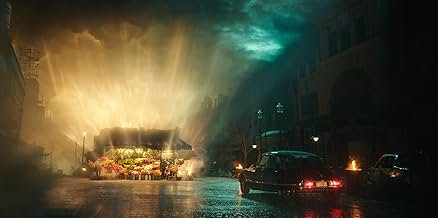Megalopolis
- 2024
- Tous publics
- 2h 18min
Un architecte veut reconstruire la ville de New York comme une utopie après une catastrophe dévastatrice.Un architecte veut reconstruire la ville de New York comme une utopie après une catastrophe dévastatrice.Un architecte veut reconstruire la ville de New York comme une utopie après une catastrophe dévastatrice.
- Réalisation
- Scénario
- Casting principal
- Récompenses
- 3 victoires et 18 nominations au total
- Huey Wilkes
- (as Bailey Ives)
Résumé
Avis à la une
It's also the kind of movie where I'm not sure overanalysing will help. Coppola is trying to say so much in one film, and a good part of it comes out nonsensical as a result. There were a few points during the film where I wondered if it was all some practical joke. It might mean a lot to him, or maybe only parts do and the rest of the time, he's laughing at us.
Somehow, all at once, I'm disappointed, exhausted, confused, and impressed. There's a certain balance here with the entertaining and boring. Visuals that look striking alongside parts that are visually garish. It's a movie that film buffs will argue about and remember while 99% of the population will continue to live their lives in blissful ignorance of its existence.
I can't quite decide whether it would be better to have be among the blissful many or the baffled 1%. I can offer no advice to anyone else who's considering giving it 138 minutes of their finite time. I'm glad I saw it and I also feel it was a bit of a waste of time.
The film's plot revolves around the ideological clash between the prodigious architect Cesar Catalina, a Nobel laureate, and Frank Cicero, the mayor of New Rome-a futuristic New York City. While the politician governs with his eyes set on the past, relying on experience and tradition in his decisions, the architect dreams of radically transforming life through a utopia enabled by "megalon," a miraculous material. Throughout the film, Coppola denounces the rampant hypocrisy and corruption of contemporary Western society. The spectacle of life, the manipulation of information, the commercialization of sex-all these are symptoms of a morally bankrupt empire, led by a decadent elite lost in excess and vanity. The only way out for such a civilization appears to be the reform envisioned by Cesar. He believes he can resolve all social contradictions through his "megalon," raising a new world from the ruins of New Rome. To achieve this, he must overcome skeptics and survive the vicious.
Although *Megalopolis* was originally conceived over twenty years ago, the discussions Coppola raises are strikingly relevant, especially in his critique of mass media and mass politics. The film has a beating heart and can engage the viewer in its most intense moments. What it unfortunately lacks, however, is structure and substance. Coppola paints his film like a Pollock painting, yet without any sense of harmony or flow in his brushstrokes, and the result is a chaotic and disjointed work. *Megalopolis* is laden with intention and argument, but it lacks direction, lacks synthesis, and fails to turn its theme into poetry. The film blends grandiose imagery, bolstered by a thunderous score, with the ridiculous, as crude visual effects bring a cheap surrealism to life. The dialogues are eloquently robotic, and they only function because of the actors who manage (which is a testament to the quality of the cast) to convey some humanity to their characters. Coppola fails to present New Rome as a believable, palpable world, which limits the viewer's ability to become involved. At no point does the city appear as anything more than a metonymy for America, and its inhabitants are not particularly compelling.
The film is also packed with homages to classics that inspired the director, with one scene, for instance, evoking the epic *Ben-Hur*. Amid so many tributes, one stands out, perhaps to the detriment of the film itself. From its very title, *Megalopolis*, comparisons with Fritz Lang's legendary *Metropolis* become inevitable. Coppola's production, in some ways, is almost a modern reinterpretation of the German master's work, with some parallels between the two films. In both, the protagonist is a wealthy young man trying to address the terrible inequalities of a futuristic society. And in both, love is a positive force that drives change-the man who loves yearns to transform society. But while *Metropolis* is flawless in its presentation, *Megalopolis* fails to convince. It does not impress with its visuals, which are largely uninteresting; it does not deliver an engaging plot, nor memorable characters. It has the virtue of saying exactly what the filmmaker wanted to say-it is assertive and confident in its message without being, however, preachy. But a dozen well-thought-out metaphors do not make a good movie.
Coppola may have become a prisoner of his own myth. Many refuse to accept anything less than a masterpiece from him, and *Megalopolis*, unfortunately, is not one of his better moments. It is a film ambitious in concept but weak in execution. It engages with the issues of its time but fails to create pathos. It reaffirms faith in humanity and the transformation of the world, but it lacks a story and characters that could amplify its message. It is certainly not a triumphant return for the director, but it is not a detestable piece of work either. For viewers willing to intellectually engage with the film and forgive its flaws, *Megalopolis* can capture attention and reasonably convey its director's ideas. It can even entertain, as the actors are fully invested in the script's quirks, and there is something charming about Coppola's vision for the future of humanity.
It's challenging to understand what Coppola's intention was with this film. It seems like he chose not to focus too much on characters but rather on themes. However, some scenes suggest that the audience should feel empathy for the characters, but one simply can't. One reason for that is the pacing of this film; it somehow manages to be fast, yet feel slow, and that might be because some scenes are dull. If we remove all the misleading character development, we are left with misleading idea development. Megalopolis bombards you with interesting ideas, but because there are quite a few of them, none of them evolves into a solid conclusion. As I already mentioned, it's hard to see where Coppola was going with all of this.
If his intention was to go against the classical narrative structure and challenge viewers with a different type of storytelling, then that didn't work either. Some scenes contain clichés, and the overall structure feels like a mix of 50s to 90s scenery. One interesting thing the movie does frequently is plant a seed that sometimes does not grow-it stays in that scene, and then we move to the next one. This method of storytelling is misleading and confusing for most audiences, and it probably would work better if this technique had a solid foundation throughout the whole film. But it simply does not feel right.
David Lynch once said that you can make any film, any art the way you want, as long as it feels right. His films are stranger and more difficult to understand than Megalopolis, yet when you watch Lynch's work, you don't feel misled-everything feels right, no matter how strange it is. Megalopolis sometimes feels right, sometimes it doesn't.
Megalopolis is a good example of how the director's stylistic touch matters to the look of the movie. The cinematography of this film was done by the same person who shot The Master. Yet this film feels like any expensive commercial shot today-too vivid, too warm, too basic.
I will definitely rewatch this film in the future, all jokes aside. This film has a shtick to it that I didn't quite get the first time watching. Overall, it's a bit sad that this is Coppola's last film, but I'm sure he has no regrets making it. After all, this is the guy who made Apocalypse Now, and I will respect him forever for his contribution to American cinema.
The plot follows the genius scientist Cesar, inventor of the revolutionary material "Megalon," with which he plans to build a utopian city of the future-"Megalopolis." This is one of the film's central themes-obsession with perfection in a world and society far from it. Envy, jealousy, greed, and the lust for power are other themes that shape the essence of this work. Coppola doesn't shy away from weaving in political commentary as well as reflections on human existence.
When I reflect on the film's themes, one might think this is a good film. On the contrary, all of these themes are destroyed by narrative chaos, which in my opinion stems from the director's pretentious ambition to present an unprecedented 'megalomaniac' work of art. The editing and narrative are disjointed-the film jumps from scene to scene with no coherence, which became tiresome after just fifteen minutes. By the midpoint, I had completely lost interest in the story and was simply waiting for it to end.
Even though most of the cast is well-known, it's difficult to connect with any of the characters-most are shallow, and some are entirely unnecessary. The only character I connected with was Cesar, thanks to Adam Driver's brilliant performance. His ability to convey Cesar's mania, dialogue, and emotions is likely the reason I stayed engaged at all, rather than the depth of the character itself. The dialogue is mixed-sometimes brilliant, sometimes dull-which made the experience quite uneven.
The cinematography is excellent, and had Coppola focused primarily on this element, this could have been an extraordinary film.
In conclusion, I can say that due to its impressive cinematography, I can't consider "Megalopolis" a bad film, but because of its awful narrative structure, I also can't recommend it to anyone. It's disjointed, unsure of which themes to focus on, and unclear about what it truly wants to convey. Uncertain in its very purpose.
The cast is full of great actors. However, the editing and plot cohesion were definitely all over the place.
Cesar's arc reminded me a bit of Legion, with him discovering maddening powers.
I am sure this will be someones favorite movie, but i think it needs time to digest for most people. It feels like a film that needs a rewatch to find new perspectives. Maybe in future retrospect, Coppola's last movie will be seen differently but for now it just doesn't hit.
Le saviez-vous
- AnecdotesFrancis Ford Coppola wrote the script in the early 1980s, but the film was kept on the back-burner partially due to his financial debts. Pre-production finally began in 2001 after filming 30 hours of second unit footage and holding table read with Paul Newman, Uma Thurman, Robert De Niro, James Gandolfini, Nicolas Cage, Leonardo DiCaprio, Russell Crowe, Edie Falco, and Kevin Spacey, but the project was scrapped after the September 11 attacks, because a scene from the script (page 166) "predicted" the attacks. Coppola fully abandoned the project in 2007, and didn't begin developing it again until 2019.
- GaffesAt 21:47, Julia Cicero's voice changes mid sentence: "I sent a letter to you last night. A childish letter", then it goes instantly deeper with "and I want it back before you read it" revealing ADR work.
- Citations
Cesar Catilina: *You* wanna help me?
Julia Cicero: Yeah. And, well, I... well, I want to learn.
Cesar Catilina: And you think one year of... medical school entitles you to plow through the riches of my Emersonian mind?
Julia Cicero: Entitles me?
Cesar Catilina: Yes.
Julia Cicero: [scoffs] Entitles me?
Cesar Catilina: Yeees!
Julia Cicero: Entitles me?
Cesar Catilina: YEEEEEES!
Julia Cicero: You have no idea about me! You think I am nothing, just a socialite?
Cesar Catilina: No, not nothing, but I reserve my time for people who can think. About science. And literature, and... architecture and art. You find me cruel, selfish and unfeeling? I am. I work without caring what happens to either of us. So go back to the cluuuub, bare it all, and stalk the kind of people that you enjoy.
Julia Cicero: Fine! I will.
Cesar Catilina: Come back when you have more time!
- Versions alternativesThe "Ultimate IMAX Experience" version of the film features a live actor asking questions during the filmed press conference.
- ConnexionsFeatured in Jeremy Jahns: Megalopolis - Movie Review (2024)
- Bandes originalesMy Pledge
Written by Grace VanderWaal
Performed by Grace VanderWaal
Courtesy of Columbia Records
By arrangement with Sony Music Entertainment
Produced and Orchestrated by Kris Kukul
Meilleurs choix
- How long is Megalopolis?Alimenté par Alexa
Détails
- Date de sortie
- Pays d’origine
- Sites officiels
- Langues
- Aussi connu sous le nom de
- Megalópolis
- Lieux de tournage
- Sociétés de production
- Voir plus de crédits d'entreprise sur IMDbPro
Box-office
- Budget
- 120 000 000 $US (estimé)
- Montant brut aux États-Unis et au Canada
- 7 629 085 $US
- Week-end de sortie aux États-Unis et au Canada
- 4 007 797 $US
- 29 sept. 2024
- Montant brut mondial
- 14 387 154 $US
- Durée2 heures 18 minutes
- Couleur
- Mixage
- Rapport de forme
- 2.00 : 1
Contribuer à cette page










































